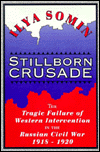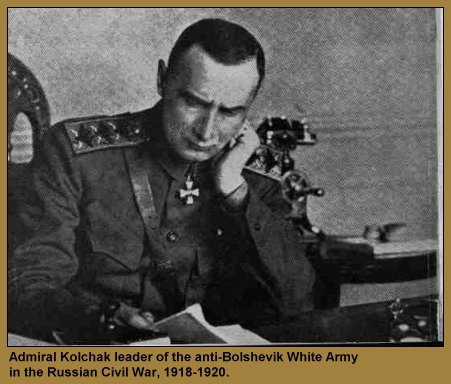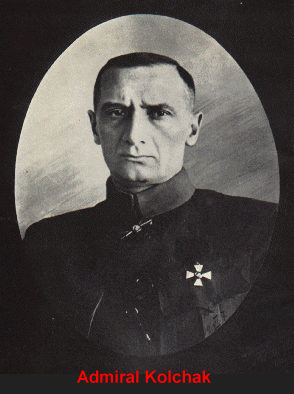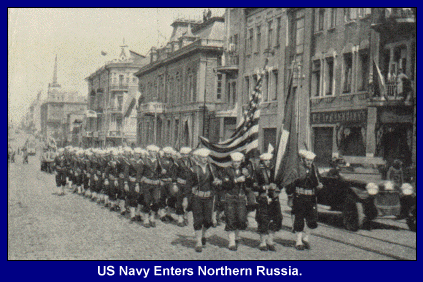Archangel, Russia
We believe that the events surrounding the Russian Civil War are providential. It is
no coincidence that the allied nations fought against Lenin in 1920. The American troops
were stationed at Archangel, Russia. Satan, of course, was the archangel who denied God.
Lenin denied God. God wanted the democratic world to crush Lenin's communism. Tragically,
leaders such as Woodrow Wilson did not understand the evil of Lenin. Evil triumphs when
good men don't fight with more conviction than the enemy.
The following is a few notes about Archangel, Russia. In time, we will complete this
section of the book. For now, we want to mention the amazing historical fact that Lenin's
Red Army marched into the city of Archangel in February 3 days before Sun Myung Moon was
born. Coincidence? The most evil, godless empire known to man was born 3 days before the
Messiah was born. Three is the number of separation. Satan struck first with his evil
ideology and its spokesman, Lenin. Three days later, God gave the world His spokesman for
truth, Sun Myung Moon.
Very few people know that American soldiers fought on Soviet land against Lenin's
Red Army. They were helping the White Army led by Admiral Kolchak who was fighting for
democracy and against the totalitarian and evil communists.
God wanted America to help the forces of good in the Soviet Union to win over the
forces of evil. Many people in America and the Soviet Union knew how evil Lenin was. World
War One ended in 1918 and the world was war weary. Satan often attacks when people are
tired. Just at the moment when the good side feels they can't give any more, that is just
the moment when they are to give more than they ever have.
President Woodrow Wilson did not realize the threat to world peace that Lenin and
his violent revolutionaries were. The American troops were sent to the Soviet Union
initially to help fight the Germans who may attack Siberia. When the war ended, Wilson
didn't give clear leadership and the British and American commanders who were stationed at
Archangel, Russia took it upon themselves to help the democratic forces that were fighting
Lenin's Red Army.
Everything was confusing. Some people were advising Wilson to fight a new battle and
others against it. In the end, he didn't pay much attention to the few thousand troops in
northern Russia and because his determination and commitment was less than Lenin's, Lenin
won. This was a golden opportunity to crush Lenin who was weak.
We all know the result of communism in the 20th century. It killed between 100 and
200 million people -- many of their own people. It has been an unbelievably horrible
bloodbath because the side of good was tired and naive. Because of the poor leadership of
Wilson and other world leaders (the exception was Winston Churchill), several hundred
American young men died a horrible death in the rugged territory of Siberia. Most of the
young soldiers had come from Wisconsin and Minnesota. There was a reason for this. God was
sending men who were used to extremely cold weather. Even then, it was incredibly
difficult because the winter they spent in Siberia was 45 degrees below zero.
The men were confused about why they were there. The story of what happened in
Archangel, Russia is so tragic that it is difficult to express in words. God had tried to
speak some people to educate everyone from Wilson down to the average American about their
responsibility to help fight the worst evil that the world had ever seen. But Wilson,
other world leaders, and Americans just didn't hear. This is the usual pattern in human
history. God tries his best but the people don't hear. And those that do hear, reject the
truth and their responsibility. Fallen man has no idea the high standard they are supposed
to live. They seldom realize how deadly Satan is and how much they have to be disciplined
and ready to give their life for freedom.
I'm only going to give a small part of the story of Archangel, Russia. There are
books that go into great detail of this tragedy. Sadly, fallen man is so blind that many
of the books see that this episode in history was a mistake. The mistake was that we did
not crush Lenin. It is understandable that we didn't do it because America and the world
were exhausted the first war that encompassed the world. But if the side of good in
mankind knew their awesome responsibility they would do what had to be done.
Stillborn Crusade : The Tragic
Failure of Western Intervention in the Russian Civil War 1918-1920
by Ilya Somin
Recently,  there has
been a very good book about what happened in this Russian Civil War. It is written by Ilya
Somin. He is an immigrant from Russia to the US, born in what was then Leningrad in 1973.
In 1995, he graduated from Amhurst College with a degree in political science and history.
The book originated as his senior thesis. He went on to become a Ph. D. candidate in
political science at Harvard. He says, "As I was writing it, I realized that I was
saying something totally at odds with what previous scholars had written on the subject,
so I decided to try to get it published and -- to my own surprise -- succeeded."
there has
been a very good book about what happened in this Russian Civil War. It is written by Ilya
Somin. He is an immigrant from Russia to the US, born in what was then Leningrad in 1973.
In 1995, he graduated from Amhurst College with a degree in political science and history.
The book originated as his senior thesis. He went on to become a Ph. D. candidate in
political science at Harvard. He says, "As I was writing it, I realized that I was
saying something totally at odds with what previous scholars had written on the subject,
so I decided to try to get it published and -- to my own surprise -- succeeded."
"I guess my main reason for writing Stillborn Crusade was
dissatisfaction with the conventional wisdom on Western intervention in the Russian Civil
War, which just condemns it out of hand. Being an immigrant from Russia added a personal
dimension, since I was conscious of the fact that members of my own family had suffered
greatly under Soviet rule in part as a result of our failure to eliminate the communist
government early, when we had the chance."
Stillborn Crusade
The author, Ilya Somin, isomin@fas.harvard.edu, on September 17, 1996 wrote the following summary of Stillborn Crusade: The
Tragic Failure of Western Intervention in the Russian Civil War 1918-1920.
"The main thesis of Stillborn Crusade: The Tragic Failure of Western Intervention
in the Russian Civil War is that the US and British governments needlessly
squandered numerous opportunities to eliminate Soviet Communism at its inception.
At several points during the Russian Civil War of 1918-20, relatively small efforts
by the US and Britain would very likely have led to the overthrow of the Bolshevik
regime, thereby saving both the West and Russians a great deal of suffering, including
millions of deaths. Most previous scholarship on Western intervention in the
Russian Civil War simply assumes that intervention was unjustifiable and
ineffective and focuses on the question of why any intervention was undertaken at
all. By contrast, I ask the opposite question: Given the very large stakes, why was
there not a bigger and more effective intervention? In Stillborn Crusade,I argue
that there were few external constraints on the ability of Britain and the US to
intervene and that there was plenty of evidence of the malevolent nature of Soviet
intentions towards both the West and their own people. Therefore, the failure to
mount an adequate intervention is largely attributable to the ideological misconceptions
of American and British leaders, particularly President Woodrow Wilson and Prime
Minister David Lloyd George. These leaders believed that the Bolshevik government
was much less dangerous than it actually was and that, in any case, intervention in
a civil war was likely to be ineffective because such conflicts are usually won by
the side with the greatest popular support. Wilson and Lloyd George also felt that
the Bolshevik dictatorship had a measure of legitimacy because it was founded
on real "social grievances," a legitimacy they were unwilling to accord
to right-wing despotisms with much stronger popular support, such as those of
Germany and Austria-Hungary. I contend that these assumptions were largely false,
as was clearly recognized at the time by proponents of forceful anti-Bolshevik
intervention, most notably Winston Churchill, the main advocate of intervention in
the British government. In the first half of the book, I review the development of
British and American intervention policy in Russian from the beginning of Bolshevik
rule to then end of the Russian Civil War in 1920 and describe the many missed
opportunities. In Chapter 4, I compare the Bolsheviks to their opponents in the
Russian Civil War, the Whites, and argue that the latter, despite many flaws, had a
realistic chance of winning and were clearly preferable from both Western and
Russian standpoints. I also consider the moral justification for intervention in
the Russian Civil War and other similar instances, arguing that outside powers have
the right to intervene in a civil conflict if one of the combatants is likely to
pursue an aggressive foreign policy upon winning or if one side is clearly worse
than the other in its violations of human rights; In my view, both justifications
were present in the Russian case. Finally, in the Conclusion, I attempt to draw out
the implications of the Russian Civil War experience for the study of international
relations and for intervention policy today. Stillborn Crusade is a clear challenge
to the conventional wisdom on both intervention in the Russian Civil War and
intervention in general. If you want to know whether it's a good challenge or not,
read the book!"
The following is from the publisher:
"The triumph of the Bolsheviks in the Russian Civil War was the first great
crack in the system of international relations established by the victorious Allies. The
presence of a powerful anti-Western Soviet regime not only undermined the liberal values
binding the signatories and member states of the Versailles Treaty and the League of
Nations, but also helped to stimulate the rise of aggressive fascist dictatorships in
Germany and Italy. Consequently, the failure of the Allies to intervene effectively
against the Bolsheviks helped pave the way for both World War II and the human catastrophe
of Soviet totalitarianism. Stillborn Crusade is a reinterpretation of the causes and
consequences of that failure. In sharp contrast with previous researchers, Ilya Somin
argues that the West's failure resulted not from constraints limiting the options of
policymakers, but from ideological misconceptions, particularly those flowing from the
'liberal' and 'realist' theories of international politics. Against these views, Somin
sets the position of Winston Churchill, who repeatedly and unsuccessfully urged decisive
action when the Soviet regime was militarily vulnerable. As a consequence of British and
American policy failures, the entire course of European and world history was radically
altered for the worse. Stillborn Crusade also considers why earlier scholars, most notably
George F. Kennan and William Appleman Williams, have ignored the issues raised here, even
though they and others have not hesitated to criticize Western leaders for similar errors
in other instances, especially in the case of Nazi Germany. Somin links the errors of
1918-20 to broader issues relating to the morality, feasibility, and desirability of
Western, especially American, intervention in foreign civil conflicts. As a volume with
important lessons for our own time, Stillborn Crusade will be of interest to historians,
political scientists, and foreign policy analysts."
Table of Contents
Acknowledgments
Introduction
The Development of British Policy
"Why Not Save Siberia?" The Development of US Policy
The Whites Reconsidered
Lost Triumphs: The Possibilities of Intervention
Epilogue: Conclusions and Implications
Harper's Monthly Magazine in the February, 1920 issue had a very good article
by William Thayer who gives good advice of the evil of Lenin and that America should stop
it. He writes, "The Bolshevist leaders, from the moment they got control in Russia,
have been actuated by the most frightful, selfish motives only. They are, indeed, the
final embodiment of selfishness. They proclaim as an ideal that they alone and the class
which they rule shall exist in the world, and that, therefore, all other classes shall be
exterminated. They have not only preached this doctrine, but they have practiced it,
murdering without mercy tens of thousands of innocent persons, whose only crime it was
that they were not proletarians. On the outskirts of the Russian cities and towns, when
the the snow melted last spring, the open spaces were loaded with long rows of corpses,
men, women, and children, shot down during the autumn and left there by the Bolshevist
murderers to be buried by the snow. The ferocity of the French Revolutionists during the
Reign of Terror was mild compared with that of these Russian fiends, and the total number
of French who were guillotined, or otherwise massacred under Robespierre or Saint-Just,
was not a hundredth part of the victims of the Russian Terror."
"They would throw over what men in many lands throughout the ages have regarded
as ideals, because they have no ideal except their own material gratification. At one of
the first places where they seized control the newspapers reported that they held a great
mass-meeting, at which, unanimously and amid immense enthusiasm, a resolution was adopted
to abolish God. Now God, however He be specially defined in different creeds, everywhere
stands for the sum of men's conceptions of Good; quite logically, therefore, the
Bolshevists, having no conception of Good, thought it a proof of their power to abolish
God -- that is., human aspiration toward, and belief in, Good. Had they known history, had
they observed individuals on fire with the passion for the good, they would have
recognized that the votes of all the evil persons in the world could never abolish it. For
the Bolshevists this act was mere bravado, which surely gave the measure of their
insanity."



 there has
been a very good book about what happened in this Russian Civil War. It is written by Ilya
Somin. He is an immigrant from Russia to the US, born in what was then Leningrad in 1973.
In 1995, he graduated from Amhurst College with a degree in political science and history.
The book originated as his senior thesis. He went on to become a Ph. D. candidate in
political science at Harvard. He says, "As I was writing it, I realized that I was
saying something totally at odds with what previous scholars had written on the subject,
so I decided to try to get it published and -- to my own surprise -- succeeded."
there has
been a very good book about what happened in this Russian Civil War. It is written by Ilya
Somin. He is an immigrant from Russia to the US, born in what was then Leningrad in 1973.
In 1995, he graduated from Amhurst College with a degree in political science and history.
The book originated as his senior thesis. He went on to become a Ph. D. candidate in
political science at Harvard. He says, "As I was writing it, I realized that I was
saying something totally at odds with what previous scholars had written on the subject,
so I decided to try to get it published and -- to my own surprise -- succeeded."

